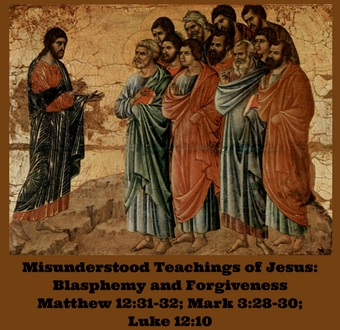THEOLOGY & APOLOGETICS
Misunderstood Teachings of Jesus Part 3
Blasphemy and Forgiveness
By Christopher Schwinger


Misunderstood Teachings of Jesus, the Series
Reconciliation with God and Man
The Prodigal and his Brother
Blasphemy and Forgiveness
Application

Matthew 12:31-32, Mark 3:28-30, Luke 12:10: Blasphemy of the Holy Spirit
The misunderstanding about this teaching is that God cannot forgive someone who has done it—so if you've done it, you're unforgivable. I did a long article of 6 parts about this, and the last part gets into the specific arguments made by legalistic people about this. (Blasphemy of the Holy Spirit: Grace ) But here I'm going to keep it really simple. First, here are 6 cases where Jesus' teachings should not be understood literally and absolutely:
1. Matthew 5:38-39: "Turn the other cheek" is in a context of an angry populace in an era of attempted revolts. Self-defense is not directly addressed in the New Testament.
2. Matthew 19:9: Divorce for any reason other than sexual unfaithfulness is adultery, according to Jesus, but this was in the context of a selfishly motivated question by Jewish opponents, and the Mosaic Law's permissiveness of easy divorces. Abuse is not addressed.
3. Matthew 18:18: "Whatever you loose shall be loosed in heaven" (the "keys of the kingdom" passage): The Catholic Church believes Peter was the original pope and that the popes have power over people's souls. It actually means Jesus is bestowing spiritual authority on the apostles to be His heavenly agents on earth, nothing more.
4. Luke 18:18-30: Telling the rich man to sell all he has after the rich man wants to know how to get eternal life: This is in the context of the man's values and priorities, not a burden we must attain to in order to please God.
5. John 14:13-14: Jesus promised His disciples that if they asked anything in His name, it would be granted to them, and they would do greater things than even Him. This must be understood as miracles in the early church for the propagation of the Gospel, and not a promise of always getting what you want.
6. Matthew: 7:18: Jesus said a good tree cannot produce bad fruit, or a bad tree good fruit, but there are definitely Christians who are ungracious but still strong believers in Christ and devotees of His Word. This is more rhetorically useful than practically useful, like the Old Testament distinction between "the righteous" and "the wicked".
Mark 3:30 is the one place which gives a specific context to His "blasphemy of the Holy Spirit" statement: "because they were saying, 'He has an unclean spirit.'" They were calling good evil. In Matthew 12, the statement which comes right after the blasphemy of the Holy Spirit is about good and bad behavior reflecting the deeper condition of the heart. The two possibilities I see of how this "blasphemy of the Holy Spirit" issue could be interpreted are 1) Jesus is condemning them because they rejected "Him who sent Me" by rejecting the evidence, because He represents heaven and is not just a man of this earth; "cursing Me doesn't matter, except that you're cursing Him who sent Me, the Father and Holy Spirit," OR 2) He was saying people can get to a point of rejecting Him willfully, and being unredeemable, so that nothing will ever change their minds. The first interpretation is a lesser-to-greater argument, which is also used a lot in the Book of Hebrews (such as 12:25, contrasting Moses to Jesus), and the second interpretation focuses on the signs Jesus did as evidence of the Holy Spirit, and in essence says "If even that doesn't convince you, then you're hopeless." That happens to some people, I believe.
The only New Testament letter which resembles the "blasphemy of the Holy Spirit" teaching is the Book of Hebrews which says it's irreversible when you have fallen away from the faith. The Book of Hebrews has been analyzed intensely to understand what is really meant by that in 6:4-6 and 12:17. If you just replace "since" or "because" in v. 6 with "while," then its idea is "It's impossible to repent while you're defying God." There are articles on the internet which try to scare people about the blasphemy of the Holy Spirit, making you afraid to be confident about your salvation because you may have unintentionally blasphemed the Holy Spirit and can't get forgiveness for it. Just one example is needed to nullify this scare tactic: Saul of Tarsus who became Paul. He was calling the early Christians evil and rejecting the things he heard them say. He surely heard rumors that they were doing miracles, too. He didn't even listen to his teacher Gamaliel's advice about leaving the early Christians alone in case they were on God's side. But God forgave Paul. Case closed.
Image Credit: Duccio di Buoninsegna; "Appearance of Christ on Mt. Galilee"; 1308-1311; Public Domain
Tags: Biblical-Truth | Christian-Life | Controversial-Issues | False-Teaching | Jesus-Christ
comments powered by Disqus
Published 9-5-16

